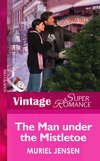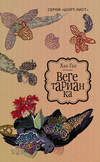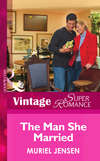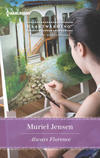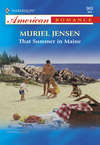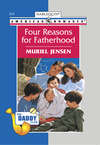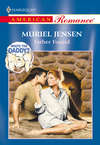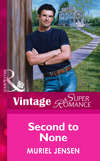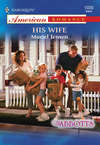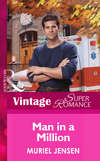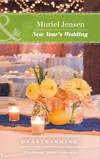Czytaj książkę: «The Man Under The Mistletoe»
“It’s time to look at things from a new perspective.”
“A lot of time has passed,” Rosie agreed coolly, “but my perspective remains the same. I lost my brother, my father and our baby in the space of a week, and you…” The anger turned to pain for an instant, but she tossed her head, seeming to shake it off. Being angry at him was apparently more comfortable than hurting. “You left me.”
“You drove me away,” Matt corrected.
“I had lost…three of the most important people in my life!” Her voice rose. “Did you expect me to be the same perky little debutante you married?”
“Of course not. I just wanted you to remember that I was there to offer support, comfort, a way back. But you didn’t want to come back.”
Dear Reader,
I’m a great lover of Christmas and all the warm and cozy rituals that surround it. This story incorporates them, but against a backdrop of old grief, the threat of danger and a husband and wife who loved each other more than anything until tragedy drove a wedge between them.
Even against those odds, love conquers all. And when this happens at Christmas, emotions are heightened and the joy is even greater.
Read all about it!
Happy holidays!
Muriel Jensen
The Man under the Mistletoe
Muriel Jensen
In loving memory of my brother, Matthew Charbonneau,
called home much too soon. I will always remember kitchen
chairs lined up in a row as we played Rocky Jones,
Space Ranger; Necco Wafers candies used for
Holy Communion when we played Mass; and, when I was
eight and he was twelve, flying down the Dean Street hill
on the handlebars of his bike in complete confidence that
he would get us safely to the bottom. Love you, Mattie.
CONTENTS
PROLOGUE
CHAPTER ONE
CHAPTER TWO
CHAPTER THREE
CHAPTER FOUR
CHAPTER FIVE
CHAPTER SIX
CHAPTER SEVEN
CHAPTER EIGHT
CHAPTER NINE
CHAPTER TEN
CHAPTER ELEVEN
CHAPTER TWELVE
CHAPTER THIRTEEN
CHAPTER FOURTEEN
CHAPTER FIFTEEN
CHAPTER SIXTEEN
CHAPTER SEVENTEEN
CHAPTER EIGHTEEN
PROLOGUE
ROSIE DEMARCO SAT opposite Jackie Whitcomb at a table for four in the Breakfast Barn’s meeting room. The restaurant was the heartbeat of Maple Hill in western Massachusetts. In this first week of December, a waitress and two busboys were hanging paper snowflakes from the light fixtures.
Also at their table were Molly Bowers, a florist, and Adam Bello, who owned Bello Automobile Agency.
“So that’s about it, Jackie.” Rosie pushed away her half-empty plate and consulted her notes one more time. “Maple Hill’s Industrial Growth Committee is officially reactivated, and all because Molly and Adam and I were at the same table at the fall festival dinner and got to talking about the health of business in this town. Molly has served on the committee before, but this is Adam’s first time.”
Adam smiled enthusiastically. He was young and personable. “We could use a little clean industry here to bring in jobs and give us more to depend on than tourism.”
Jackie, Maple Hill’s mayor and a descendant of one of the town’s founding families, was a lively redhead with a genuine devotion to the community. She spread her hands, her smile taking in everyone at the table. “That’s great news. And you think Tolliver Textiles is willing to try us again?”
Rosie nodded. The company had been considering a move to Maple Hill from Boston two years ago, but circumstances had conspired to defeat the plan.
“I spoke to the new president of the company yesterday,” Rosie told her. “They’d moved to a temporary space in an old mill on the Charles River when the last deal fell apart. He’s anxious to get out of there, but we both agreed that the holiday season is a bad time to talk about it. Everyone is too busy. He’s coming to Maple Hill right after the new year to talk to us in person.”
“And we have a new location for him to consider,” Molly said. She was a full-figured blonde in her mid-fifties who, not surprisingly, always smelled of flowers. “There won’t be any environmental surprises like the last time when we discovered a heron rookery that was missed on the impact statement. I wish Dennis Sorrento could join us again, but he’s had a few health problems and he’s trying to scale back.”
Dennis was a pharmacist who’d been an important part of the committee’s first incarnation.
“That’s too bad,” Jackie replied. “But you sound as though you have a good handle on what you’re doing, Rosie. Maple Hill has a reputation for sound business while maintaining its beautiful surroundings. Just keep that in mind.”
Rosie nodded. “Haley’s joined the committee, but she can’t meet with us until January. She has her hands full with the special holiday-shopping edition. A good thing for the publisher of the Maple Hill Mirror, but not necessarily for the wife of a busy lawyer and the mother of a toddler.”
Jackie rolled her eyes. “My niece is a wild child.” Jackie was Haley Megrath’s sister-in-law, and little Henrietta’s aunt and godmother.
“I’ve seen her in action.” Rosie reached into her purse for her wallet. “But my point was that with Haley on board, we’ll be secure in the knowledge that our every move will be monitored.” Haley was famous for taking on anything or anyone she considered a threat to Maple Hill financially, ecologically or in any way at all.
“Well.” Jackie consulted the bill and took out her own wallet. “Your committee has my blessing. Keep me informed.”
“We will.” Rosie glanced at her watch, then smiled at her companions. “I’ve got to go back to my shop. Last fitting on my sister’s wedding dress this afternoon.”
As the group stood to go their separate ways, the lone occupant of a corner booth watched in angry disappointment and thought, So Rosie chose to ignore my warning. Something will have to be done….
CHAPTER ONE
ROSIE FLUFFED the tea-length hem of her younger sister’s wedding dress and stepped back to get the full effect. One hand on the louvered door of the dressing room, she assessed the lace draped over Francie’s impressive bosom, cinching her slender arms and tiny waist, fluttering around her ankles as she did a turn.
With Francie’s blue hair and pierced eyebrow, she was hardly an ad for Vera Wang, but she did sparkle. And she looked happy.
“The alterations are perfect,” Rosie said. “The dress is as beautiful on you as we knew it would be. What do you think of the muff?” A soft, faux-fur material, it matched the band of the hat she’d chosen. “Gives it all a Christmassy look, don’t you think?”
Francie nodded at Rosie’s reflection in the mirror. “I love it. Mom?”
Sonja Erickson, “Sonny” to friends and family, squeezed into a corner of the built-in bench, looked as though she had an appointment for cocktails at the Polo Lounge even though she was three thousand miles away in a tiny dressing room in snowy Maple Hill, Massachusetts.
The light blue gaze she cast over the dress revealed nothing. Then she sighed—a sign that she knew her opinion wouldn’t be well received so she would keep it to herself. “It’s very pretty,” she said. “Very pretty.”
Francie closed her eyes—a sign that after twenty-three years of dealing with her mother’s criticism, she still let it get to her.
Rosie tried to distract Francie by reaching for the veiled hat she’d selected to go with the dress, but she was too late.
“It’s the hair, isn’t it?” Francie demanded, turning with a swoosh of taffeta to glare at her mother. “I told you it’s staying blue. Deal with it, Mom!”
“I’m dealing,” Sonny replied with a calm smile.
Rosie had always admired that her mother could do that—react to shrieks of anger and frustration like an amused goddess. She was the composite of a fifties up-bringing that forbade expressing displeasure, and a talent for making everyone around her somehow pay for what she was feeling but couldn’t show.
At last she heaved a long-suffering sigh. That meant all bets were off. Her mother would say what was on her mind.
“It’s the eyebrow ring I’m worried about.” She stood gracefully, still fashionable at fifty-seven in a classic suit. “What if your veil gets caught in it? Will there be blood everywhere? Will you need plastic surgery? What personal statement is worth ruining your wedding day?”
“It’s not a statement of anything!” Francie screamed. Blue hair did not flatter a purple face. In the little room, the sound of Francie’s voice ricocheting back and forth took on a physical force. “It’s who I am, that’s all. It’s me!”
“Mom, Francie,” Rosie pleaded quietly. “I have other customers…”
“You were not born with an eyebrow ring!” Sonny shouted back. “Believe me! I’d have noticed during my thirty-seven hours of labor!”
“Oh, God.” Francie put both hands to her ears. “If you regret having me so much, why did you do it? You already had two beautiful overachievers!”
“I do not regret having you!” Sonny said heatedly. “But there are moments when I regret letting you live! I’ll be in the car.” She handed Rosie her Visa card.
Rosie pushed it back at her. “Mom, I told you. The dress is my gift to Francie.”
Her mother took her hand and forced the card into it. “Don’t be ridiculous. You know Happily Ever After will be out of business before spring. You’re going to need the money.”
That salvo delivered, she left the dressing room. Seconds later the bells over the front door tinkled. Her daughters knew she wasn’t going far—she’d brought Francie to the shop, after all, and would be taking her home.
Rosie sank onto the bench.
“Why does she hate us?” Francie demanded.
“Try this.” Rosie handed Francie a veiled bowler hat. “She doesn’t hate us. She just doesn’t know how to love us.”
Francie put on the hat, then tugged the veil carefully down to her chin.
Rosie knew she’d been right about the choice. A standard headpiece and veil would have accentuated Francie’s nontraditional hair and piercing. The hat and muff worked with them.
Francie nodded at her reflection, her expression softening. She looked at Rosie in the mirror as she played with the veil. “I don’t understand. What’s so hard about it?”
“I’ve been working on that for a long time.”
“I thought being willing to die for your children was supposed to be instinctive to all mothers.”
“Oh, I think she’d die for us. She just finds it really hard to live with us.”
Francie handed back the hat, then reached behind her to unzip the dress. Rosie stood to help her. “You and I,” Francie said moodily, “are never going to make her happy. How do you stand it? She always makes me feel like the last kid picked for the baseball team.”
Rosie held the dress with one hand and helped Francie step out of it with the other. “You have to get over the idea that you’re responsible for her happiness.” She eased the dress onto a hanger. “She’s had a rough time, you know? She always looks as though she’s got it together, so we expect her to behave that way. But inside, she’s more at a loss than she’ll let us believe.”
Francie made a scornful noise as she slipped into jeans and a red, crushed-velvet sweater. “You’re saying she wasn’t like this before Jay and Daddy died? I don’t remember. Seems like she’s been on my case forever.”
She watched as Rosie stuffed the skirt into the plastic cover, smoothed it neatly and pulled up the zipper, then asked, “Do you ever wonder about Dad?”
The confines of the tiny room made avoiding eye contact difficult. Besides, Rosie found it hard to lie to the sister to whom she’d explained menstruation, sex and geometry.
Still, she hedged. “About what, particularly?”
Francie shifted impatiently. “About not loving us enough to want to live.”
God. Only her family could take an afternoon in a bridal shop and turn it into a Faulkner novel.
“And don’t try to put a positive spin on it,” Francie went on. “Even you can’t do that. Dad was so devastated by Jay’s death that he didn’t want to live. I mean, think about it. What does that say about you and me, his daughters? Didn’t it occur to him that I’d need him to walk me down the aisle one day? Or that you’d have babies who’d need a grandfa—” She stopped abruptly, looking horrified, then spread her arms in apology. “I’m sorry. I didn’t think…”
Rosie snatched the dress off the hook and carried it out into the shop, needing to escape the words, knowing she couldn’t.
The store smelled of a spicy-sweet carnation-and-vanilla potpourri and she breathed in a whiff of it to reestablish her equilibrium. This is me, she told herself firmly. Beautiful things, steady little business, cheerful, grateful clients. Not the grim confusion my life has been for the past two years.
“Don’t be silly,” she said, hanging the dress on a rack behind the counter as Francie joined her. “Women have miscarriages every day and don’t expect other people to apologize every time a baby is mentioned. Now. Yes, it bothers me about Dad. He didn’t have much time for us, but he adored our brother and there’s nothing we can do about that now that they’re both gone. So…try to have a little more sympathy for Mom. She played second fiddle to Jay, too. If you worry about Dad not caring enough to stay with us, imagine how she must feel.”
Rosie reached to the shelves behind her for a hatbox.
“I feel sorry for Chase, too,” Francie said, “living out here in the boonies with his grandmother and his aunts.” She held the box steady while Rosie placed the hat into the tissue. Their eight-year-old nephew had already suffered more than his share of tragedy. His mother had run off with a group of musicians, and his father had died in a grizzly accident.
“Yeah, well, he’s a brave little boy.” Rosie put the lid on the box. “You want to take the dress and hat home, or do you want me to keep it for you?” The wedding was only a week away, but Francie’s room in the family home still looked like a fourteen-year-old’s.
“Keep it, please.”
Rosie put the hatbox back on the shelf and slapped a label on it that read, Francie. “I worry about Chase, too,” she said. “Fortunately, he has Jay’s sunny nature.”
“Did you find somebody to help you watch the shop so you can take care of him while Mom’s in California with Aunt Ginger and Aunt Sukie?”
Rosie nodded. “It’s all handled. I’ll move from the guest house into the house while Mom’s gone, and Sara will help me with the store if I need her.” Sara Ross, a friend since high school, could be depended upon to step in whenever Rosie needed anything. “Now. What else do we need? Slip? Stockings?”
“Rosie?”
“Yeah.”
“I have something else to tell you.”
Rosie detected something worrisome in Francie’s tone. For all her sister’s pugnacious need to quarrel with their mother, she’d never argued much with Rosie. They’d been too busy commiserating with each other to fight.
“Francie,” she said firmly, reaching into the storage under the counter to pull out a box of stockings, “you’re going to be married in a week. It’s no time to talk about death or miscarriage or—”
“I wasn’t going to.” Francie put a hand on Rosie’s. Then she drew a breath, raised her eyes to heaven and blurted, “I asked Matt to give me away.”
If anything could have made this day harder on Rosie’s nerves than it already had been, the mention of her ex-husband was it. Especially as part of her sister’s wedding party. Rosie was the maid of honor.
“I didn’t ask him to take pictures,” Francie continued. “I’m sure he’d do a better job than the photographer we hired, but I just want him to walk me down the aisle.” Her fingernails were digging into Rosie’s palm. “Please tell me you don’t hate me. Please tell me you won’t chicken out on me because Matt’s coming. Please.”
Francie was near tears. She had a theatrical turn to her nature and could call them up at will, but Rosie knew these were genuine. Francie had loved Matt from the day Rosie had brought him home to meet the family. With no father to give her away, she no doubt thought it logical to ask Matt. Their mother had offered to give her away as was often done in fatherless weddings, but despite her rejection of tradition in many aspects of her life, Francie had always been halfhearted about the idea.
Rosie smacked Francie’s hand with the box of stockings. “I won’t walk out, but I do hate you. When’s he coming?”
“Friday. He’s…” She avoided Rosie’s eyes and added quickly, “He’s staying with us.”
Oh, good. There was nothing Rosie wanted less than to have the man who’d walked out on her in the darkest period of her life move right back in, even for a couple of days.
“He asked me if I’d asked you first. I told him I had and that you said it was okay.” Francie related the lie with no apparent evidence of guilt.
Rosie nodded. “I’m going to hurt you, Francie, before I kill you. He’d better be on his way home before I move into the house to stay with Chase.”
Francie reached across the counter and hugged Rosie fiercely. “I’m sure he will be. He’s going to China, you know.”
Rosie was more puzzled than interested. “China?”
“He has a contract for a pictorial book. I guess he’s giving up newspaper work for a while. He says he wants to travel.” Francie glanced at the door. “I’ve got to go before Mom drives off.” She hesitated one more moment to look into Rosie’s eyes. “You’re sure you’re okay with this?”
How could she ever be okay with it? But she was the big sister. She had to be okay.
“Of course,” she replied.
“Good. You going to be home for dinner tonight? Afterward, I’m making birdseed bags for the wedding.”
“I’ll be there.”
“Okay. See you then. Thanks, Rosie.”
Rosie stepped out into the sunshine to wave her mother and sister off as though the afternoon had been fun, rather than an exercise in anger management. All attempts to spend time together ended that way. She could hardly wait for dinner.
Her mother waved dutifully, the martyred little smile on her face; it was first cousin to the long-suffering sigh.
Rosie watched the dark blue Mercedes drive away and had the same thought that crossed her mind every day. She should move away, get her life together, find out who she was when she wasn’t connected to the high-strung eccentrics who made up her life.
But that would leave Chase without an ally now that Francie would be out of the house, and though her mother loved Chase, Rosie knew from experience that that didn’t necessarily mean she could help him develop into a well-rounded individual.
Rosie also hated the thought of leaving Maple Hill. Her father had been born here and inherited her grandfather’s construction company. Though he’d worked for his own company in Boston for many years, the family had spent summers and the Christmas holidays at Bloombury Landing, their family home on the lake. In Maple Hill, in the foothills of the Berkshires, winter, and Christmas, particularly, were spectacular.
Maple Hill dated back to colonial days, and its main street still looked as though a minuteman with a musket might appear at any moment. Most of the buildings built around the town square dated back to that time, or had been rebuilt in keeping with that era’s architecture. It was a lively little center of commerce in a picture-perfect setting.
Rosie loved it here. She loved the town’s rich history, the press of tourists in the summer, the red and gold leaves of fall, the pristine snow in the winter. Add to that the warmth and comfort of old friendships, and it was a wonderful place to be.
She felt she belonged here. Her reasons were complicated, but primarily, she thought it was because her dreams had been born here. They had died here, too, yet somehow, strangely, that had only strengthened her bond. Right now she existed somewhere between hope and devastation, unable to believe in a future here, but also unable to give up on it.
And—she even hated to admit this to herself—she couldn’t quite dispel the feeling that her mother clung to her. Not physically, of course, not with any apparent emotional dependency, but sometimes Rosie heard something in her voice, saw something in her eyes that recalled a long-ago past when things had been different.
Every time it happened, Rosie would chase the memory only to come to a dead end. Then she would tell herself she’d been imagining things, that she and her mother had never been that close. But that look in her mother’s eyes said things Rosie felt, rather than remembered, and she couldn’t quite dismiss it.
So she had to stay. At least for a while. At least until Gillian Howe of the Runway Boutique got serious about adding wedding dresses to her shop in Springfield just a few miles across the Connecticut River and bought Rosie out.
Then, with money in hand to plan the future, Rosie could think about whether it would be worth it to leave the place where she really wanted to be, to find the woman she really was.
“YO! MATT!”
The frantic sound of a woman’s voice was followed by loud rapping on the darkroom door.
“We’re developing!” Shorty shouted as he washed the contact sheet. “Don’t come in, Jenny!”
Matt DeMarco looked over Shorty’s shoulder as the faces of children at a local science fair began to materialize into the neat little squares of the contact sheet that represented every frame on the roll of film. He was fairly sure the Sacramento Sentinel was the only newspaper in the West that still developed film in a darkroom. Shorty and technology didn’t get along.
“I need Matt!” Jenny shouted.
“Control yourself, woman!” Shorty hung the contact sheet by a clothespin to an overhead line. He pointed a pen to one particular shot, as usual picking out the best one on the roll. It wasn’t showy or necessarily dramatic, but a ten-year-old boy’s excitement in his science experiment shone from a pair of dark blue eyes. “That’s it, Matt. Discovery. Pride. How do you always manage to find the definitive face?”
“I don’t find it, Shorty. I just shoot what’s there.”
“Come, now. When you have a fifty-thousand-dollar advance in your pocket, there’s no need to be modest.”
“Ma-att! I need you! There’s a fire at Hudson’s Department Store! Top floor completely engulfed!”
“Too bad,” Shorty said as Matt snatched his camera off the stainless-steel table. “I thought she just wanted you for a quickie in the news van.”
Matt reached for film in an overhead cabinet and headed for the door. “Well, I can always dream,” he said with a chuckle, opening the door to a small hallway.
“Come on, Matt, let’s go!” Jenny Morrow grabbed Matt’s arm and pulled him down a corridor to the back door and the newspaper’s parking lot. Matt marveled at her energy. She was out-of-control enthusiasm and mouth.
She was also very beautiful, glossy brown hair flying as she ran toward her Honda.
Matt peeled off toward his Mustang, unlocking the door with the remote as he approached.
She finally realized he’d taken off in another direction and raced to follow. “Why don’t I ever get to drive?” she asked, catching up with him. She climbed into the passenger seat as he got in behind the wheel.
The Mustang did zero to sixty in five seconds, shooting out of the parking lot like a thumbed rubber band. It wasn’t as though the fire would be out before they got there, but he always wondered what he was missing while he was still on his way.
“You have a tendency to drive where other cars are parked.” He braked at the corner and cast her a grinning glance before looking quickly left, then right.
“One time! I hit a parked car one time!”
“It was a police car.”
She groaned. “The cop forgave me. Isn’t it time you did?”
“It was embarrassing.”
“Oh, get over yourself. It’s time you trusted me.” She put commands into her laptop even as she spoke to him and helped him watch for a break in the traffic. “We’ve been on stakeouts together, we’ve barfed at traffic accidents, we’ve lied our way out of tight spots, we’ve cried together…”
“When?”
“That story on the children’s wing of the hospital. Remember? The little girl with—”
“Oh, yeah.” He raised a hand to silence her. Somehow that little girl fighting lymphoma had reminded him of his own child, who’d never even lived to see the light of day. “I remember.”
The road clear, he sped off, as much to escape the memory as to take advantage of the opening in traffic. “I’m an important photojournalist now.” He faked an imperious air. “I have an image to protect.”
Jenny made a scornful sound. “Well, unfortunately for you, my mother believes that. You’re invited to dinner again next weekend.”
Jenny’s mother had designs on him for her daughter. She tried to be subtle about it and failed miserably. Matt and Jenny smiled at her matchmaking efforts, knowing that nothing more than friendship was possible between them. Matt was too reserved for Jenny, and her hyper behavior made him crazy.
He made the turn toward the department store. Smoke and flaming cinders filled the air. She pointed ahead. “There’s the police barricade.” He pulled over to park.
“Notice how I did that without hitting anything?” he said.
She punched him in the arm.
In the next block fire trucks and hoses were entangled in the street and a crowd of people had gathered to watch the flames. “Please offer your mom my apologies,” he said, reaching for his camera, “But I can’t go. I’m leaving tomorrow for my sister-in-law’s wedding.”
Jenny frowned at him. “You mean, the dragon’s sister is getting married?”
“Who said she was a dragon?”
“Aren’t exes always dragons?”
“I don’t know. Rosie’s the only ex I have, and she’s more of a…” What? he wondered. What described a woman who’d withdrawn so completely he could no longer reach her? “A turtle, I think.”
“You mean she moves slowly?”
“No.” He shook his head to end the discussion. She didn’t get it. But then, he’d been there, and he didn’t get it completely, either. He pushed his door open. “Come on before they put the damn thing out.”
Darmowy fragment się skończył.

